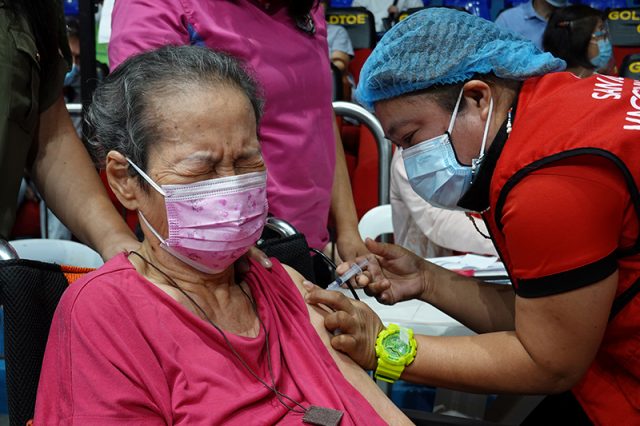
SPONSORED ARTICLES
Vaccinated individuals are not high-risk spreaders of COVID-19.
The Department of Health issued this statement on January 10 following a circulating social media post that made this claim.
“The Department of Health denounces the circulating social media post claiming that vaccinated individuals are considered to be high-risk spreaders of the virus,” DOH said.
The health department pointed out that vaccinated individuals can still get infected with the virus.
However, they are less likely to get severe illnesses due to COVID-19 and transmit it to others.
“Anyone can still be infected with the virus, whether vaccinated or unvaccinated, and can transmit the virus. That is why vaccinated individuals still need to wear face masks, practice physical distancing, stay in well-ventilated areas, and sanitize their hands,” DOH said.
“However, there is also clear evidence that vaccinated individuals shed less virus,” the health agency added.
DOH then reminded the public to continue observing the prescribed preventive measures and isolate immediately should they experience symptoms of COVID-19.
“We remind the public to earnestly implement minimum public health standards and immediately isolate and get tested on the onset of symptoms and/or if identified as a close contact,” it said.
“These shall prevent further spread and transmission of the virus. More transmission, more mutation. Let’s all do our part in keeping our family, friends and community safe,” it added.
Some social media users have become hesitant and even afraid of getting jabbed against COVID-19 amid the skyrocketing daily tally of COVID-19 infections in the country.
Reporter Jeff Canoy previously shared screenshots of some of these comments from DOH’s Facebook page.
“Gumagana po ang bakuna. Hindi po dahil bakunado ay di na mahahawa. Ang bisa po nito ay di gaano katindi ang sintomas. Kung walang bakuna, posibleng mas matindi ang tama ng sakit,” Canoy wrote, alleviating the public’s fears of getting COVID-19 shots.
Nakakangamba na ito ang takeaway ng maraming Pilipino sa pagtaas ng mga kaso.
Gumagana po ang bakuna. Hindi po dahil bakunado ay di na mahahawa. Ang bisa po nito ay di gaano katindi ang sintomas. Kung walang bakuna, posibleng mas matindi ang tama ng sakit. pic.twitter.com/6fjCqVZQMH
— Jeff Canoy (@jeffcanoy) January 9, 2022
Filipino doctors in the country and from overseas have also been sharing studies how COVID-19 vaccines, including the booster shots, help reduce hospitalization rates and even deaths.
Don’t believe the peddlers of natural infections. Real world data prove that vaccines work in reducing COVID-19 severity and hospitalizations. Please get your vaccines and boosters the soonest through our LGUs and your respective health facilities!
https://t.co/QCFfbzVhqs
— Harold Henrison C. Chiu, MD (@88DoubleDragon) January 10, 2022
Critical care admissions by vaccination status from May-December 2021.
The red bars = the unvaccinated.
The blue bars = the double vaccinated
The green bars = the boosted
You might have to squint to see the last one #VaccinesWork
Source
https://t.co/E2bJ2L3rmz pic.twitter.com/Uh345kWwd3
— Dr Samantha Batt-Rawden
(@sbattrawden) January 8, 2022
An article published on The Conversation cited a recent study from the medical journal The Lancet showing evidence that suggested vaccinated people can clear viruses quicker, thus become less contagious to others.
“While the peak load may be similar, vaccinated people are likely to have lower viral load overall, and therefore be less contagious. Given vaccines speed the clearance of COVID from the body, vaccinated people have less opportunity to spread the virus overall,” the article read.
The term “viral load” refers to the “amount of virus present in someone’s bodily fluids at a given point in time.”
‘Vaxxed individuals are not high-risk spreaders’: DOH says amid circulating false claim
Source: Filipino Trend Viral
0 Comments